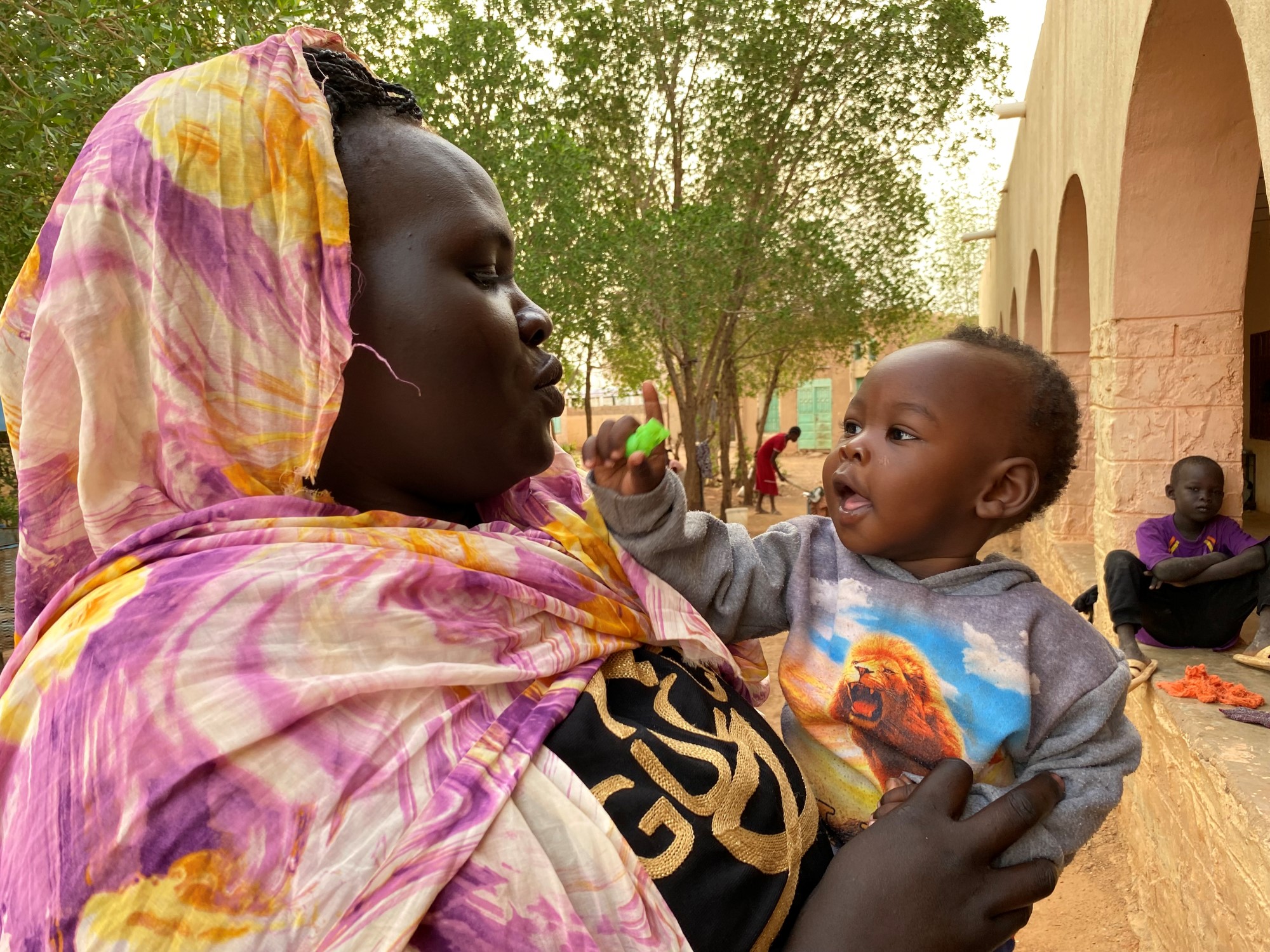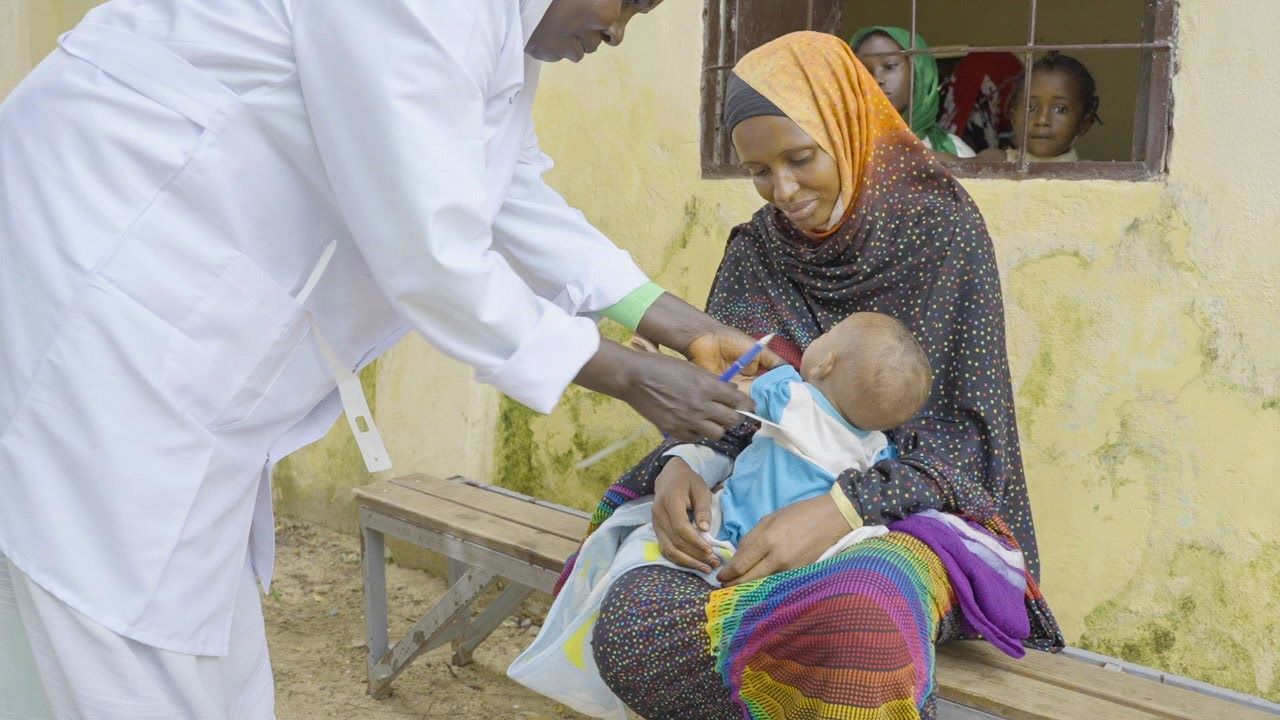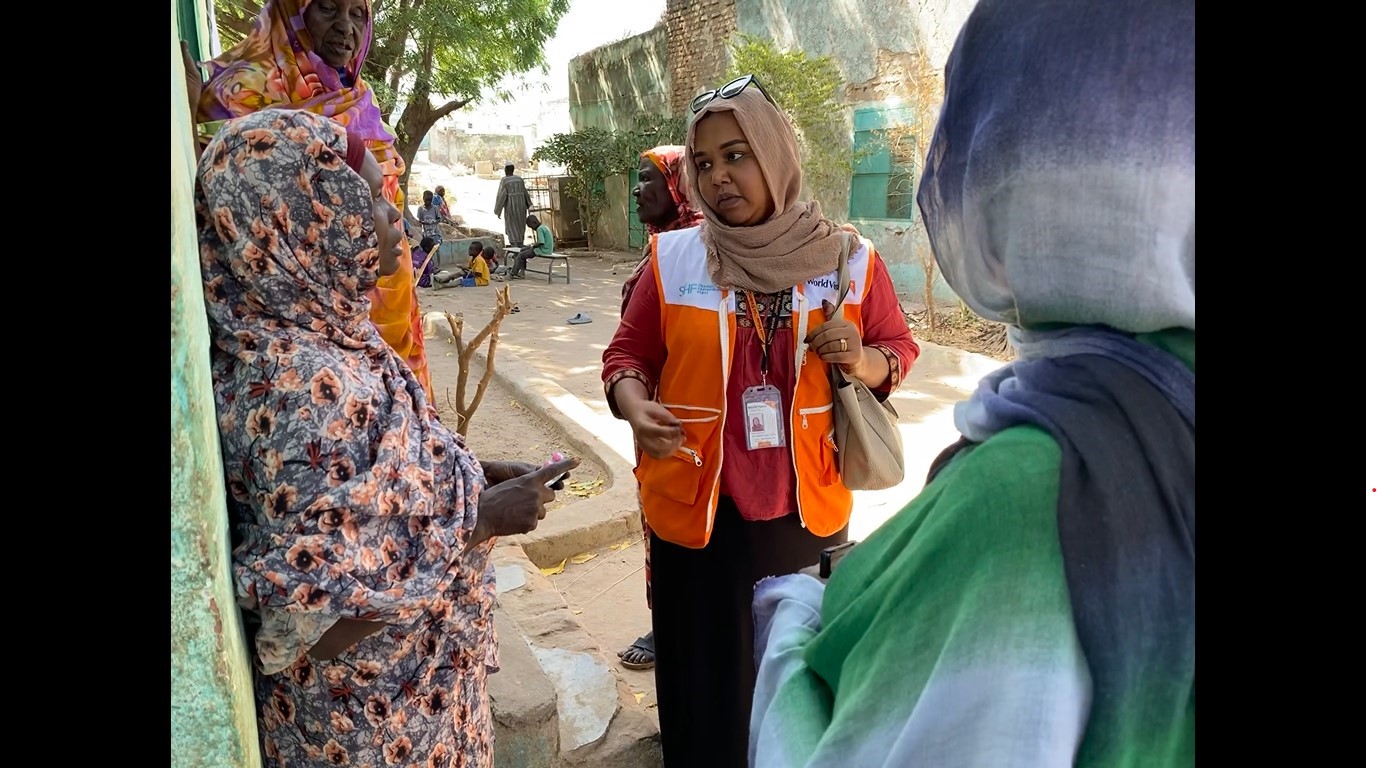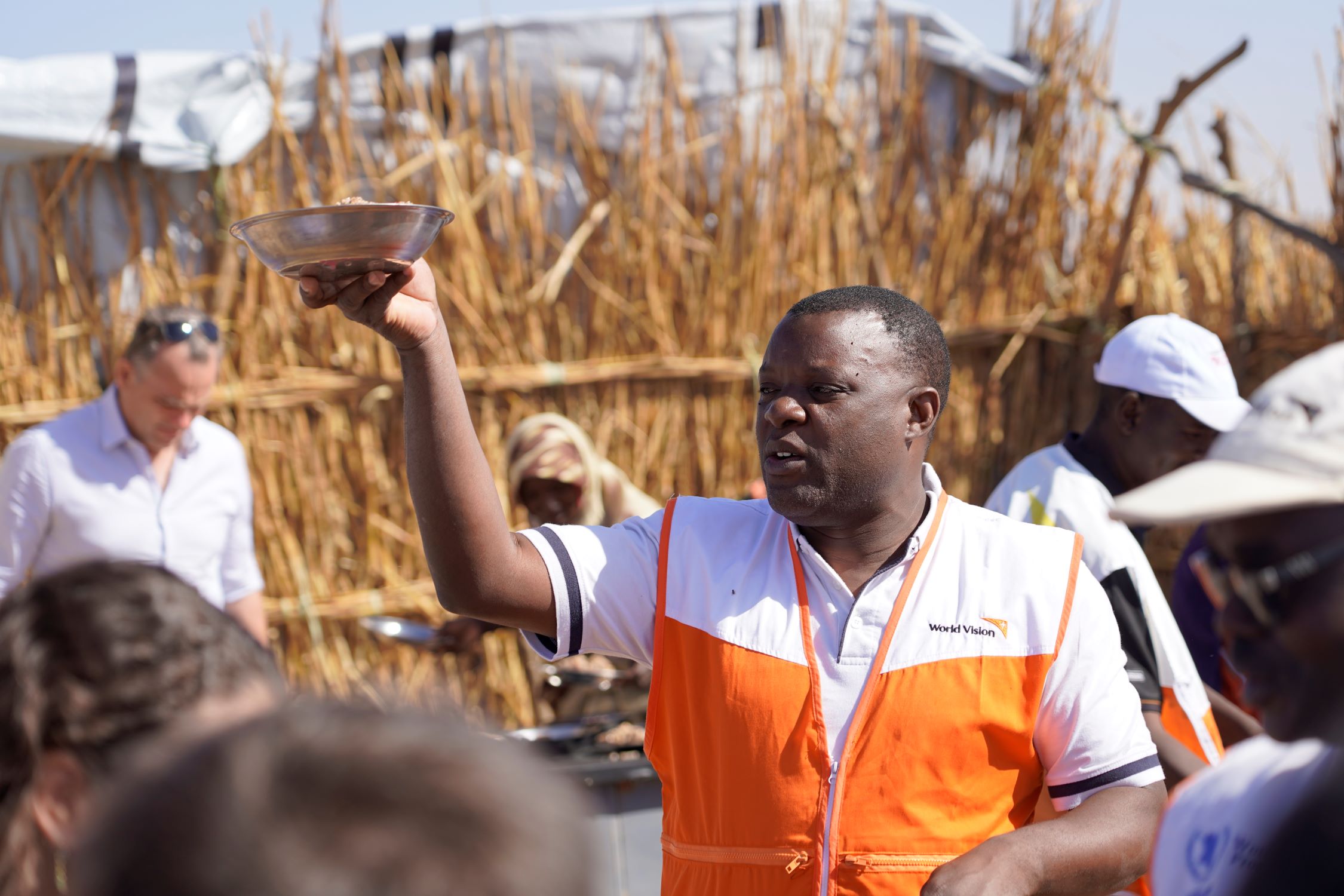
Sudan's largest refugee crisis
Conflict in Sudan forces millions to flee. How is World Vision helping?
It’s a year since the current conflict in Sudan erupted – and since then nine million people have fled their homes, many within Sudan itself while others have crossed borders into neighbouring countries. It has become the largest internal displacement crisis in the world.
Why are people in Sudan displaced?
On 15 April 2023 fighting broke out between the Sudan Armed Forces (SAF) and the Rapid Support Forces (RSF) in Khartoum, Sudan’s capital, following days of tension. The dispute centres around a proposed transition to civilian rule.
The continued fighting means that Sudan is now facing one of the worst humanitarian crises in the world. The war is having a devastating impact on over 3 million children, as they flee widespread violence in search of safety, food, shelter, and healthcare.

Conflict in Sudan forces families to flee
Amira's story
25-year-old Amira, a mother of two, fled Khartoum with her family. “My children and I were in the front room and my mother was in the kitchen [of the apartment],” Amira remembers. She heard an explosion and froze before running to discover what happened.
When Amira saw dead bodies being retrieved from under the damaged building, she fainted. Two of her friends were killed instantly in the explosion. “The lady who died was a friend of mine,” says Amira. “She died with her husband, leaving behind four young children.”
The day after the explosion, Amira, her mother, and the children fled with little money and clothes, travelling 200 kilometres north of Khartoum. They spent two days sleeping in the open before going to a school repurposed as a shelter for those displaced by the conflict.
“We had no food to eat. I spent all my savings to feed my children,” she states, adding that she and her mother lived only on water.
Effects of Sudan conflict
Children are especially vulnerable in this crisis. According to Emmanuel Isch, National Director at World Vision Sudan, child malnutrition is on the rise, millions of children are out of school, and the psychosocial impact of the conflict on children is significant. “This will have long term effects on the wellbeing of children across Sudan,” he says.
But for now, Amira is worried about the short term effects. And especially for her youngest son Gasim, just eight months old. “I noticed that I produce very little milk now and this will affect my baby’s health,” she says.
Amira is grateful for the assistance she has received at the shelter but is concerned about her children’s wellbeing – as well as her husband, whom she has not been able to reach since the war escalated.
READ MORE: How does conflict impact children?

Seif's story
Seif, a father of three children, also fled with his family as the shelling became too much. “In addition to the increasing rates of civilian deaths, cases of carjacking and home armed robbery increased. Meanwhile, it was getting difficult to find food, particularly in areas witnessing recurrent fighting,” says Seif.
The journey out of Khartoum was risky for Seif. “When I left, there were armed people who forced some young men to disembark from the bus and took them to an unknown destination. I was lucky. I made it.”
Education impacted by Sudan conflict
For Seif's children, education is at a standstill. Sadly, that’s the situation for many.
An estimated 19 million children are out of school in Sudan. Should the conflict result in schools remaining closed, this will have devastating impacts for Sudan’s wider society, as schools are often used for more than lessons, for example, immunisation clinics.
Nine-year-old Mazin is Seif’s youngest son. He has finished the fifth grade of primary education. “I hope the war will end soon so that I can join my classmates and friends in Khartoum again,” says Mazin.
Seif’s elder son, 16-year-old Sami, should sit the Sudan School Certificate next year but is not sure if this will be possible if fighting continues.
Recently, Seif lost two of his friends: one was shot dead during a carjacking attack by an armed gang and the other died in a diabetic coma. “People who are suffering from chronic diseases like diabetes are exposed to death because medical care has collapsed not only in Khartoum but all over the country,” says Seif.
Sudanese refugees face hunger and malnutrition
But it’s not just medical supplies that become scarce as the humanitarian crisis worsens. Food and water do too.
Food insecurity remains a key issue in Sudan – especially in Khartoum, Darfur and Kordofan, with an estimated 20.3 million people not knowing where their next meal is coming from.
Sadly, 3.5 million children under five are already acutely malnourished, of whom 700,000 are dangerously ill – and are 11 times more likely to die compared with their healthy peers.
We're helping those affected by the Sudan crisis
World Vision is working with people affected by the conflict, including those who are internally displaced, refugees, returnees, and vulnerable host communities.
Identifying and treating malnutrition early saves lives. Despite the various obstacles due to the conflict in Sudan, World Vision continues to provide healthcare support.
Thanks to the work of World Vision – and with the support of the Ministry of Health – some healthcare centres are able to continue, providing access to essential nutrition services.

Families receive training to become self-sufficient
Naiya's story
Two-year-old Fathi was at high risk of severe malnutrition, so his mum, Naiya, a 29-year-old mother-of-three, took part in a World Vision programme where she learnt how to provide nutritious meals. In just 12 days, Fathi improved.
Naiya attended weekly training sessions with other women where practical cooking demonstrations follow each session, helping mothers apply their new knowledge. Naiya also received vegetable seeds and gardening tools to create a kitchen garden.
“Now, I grow various types of vegetables in my kitchen garden," Naiya says. The homegrown produce has introduced new ingredients to the family's menu, improving their overall nutrition.
Mary's story
Mary is a 30-year-old South Sudanese refugee with four children and expecting her fifth.
Her 18-month-old son Deng was malnourished. She was provided with essential food items, including milk, oil, sugar, salt, and rice. After 45 days of visiting the World Vision clinic, Deng improved. Mary also received gardening tools and vegetable seeds to establish her own kitchen garden, along with cooking demonstrations.
This project, implemented by World Vision Sudan in East Darfur, has supported 1,000 households, working through 50 mother-to-mother care groups since the conflict began.
We're helping Sudanese people access life-saving essentials
Examples of other work in East Darfur include World Vision helping 6,000 people have access to safe water and over 33,000 access health services, including consultations and clinical services. We have provided nutritional services to 552 people, and shared health education sessions with over 12,000 people.
In the Blue Nile, World Vision offers health and nutrition activities through mobile clinics in the Damazine area, and will provide over 1,000 people with cash assistance.
In Khartoum , World Vision and the World Food Programme are working together on a cash-based transfer project for 50,000 vulnerable people.

More challenges for Sudan’s refugees
Protection remains an urgent priority, with an increasing number of reports of sexual violence and gender-based violence, and grave violations of human rights. As inter-communal tensions mount, the ability to access protection services and support systems reduces.
Ultimately the conflict and subsequent crisis in Sudan are impacting millions of men, women and children, who are being denied safety and freedom. “We are concerned about protection and safeguarding issues, including gender-based violence that are reported [to be] on the rise. World Vision continues to focus on these issues, including awareness and prevention,” says Emmanuel Isch.
World Vision also works in Chad, Central African Republic, Ethiopia and South Sudan, and is at varying stages of responding to the needs of people fleeing into these countries.
Join us in saying Enough to child hunger
Sadly, Sudan isn’t the only country where conflict is forcing people to flee… straight into another problem just as deadly: hunger.
No child should die from starvation. No child’s future should be threatened by malnutrition.
Right now, conflict – and climate change – means that millions of children are facing the worst hunger crisis in 50 years. But there is enough food for everyone and that’s why we’re saying ENOUGH in our global campaign to end child hunger.



